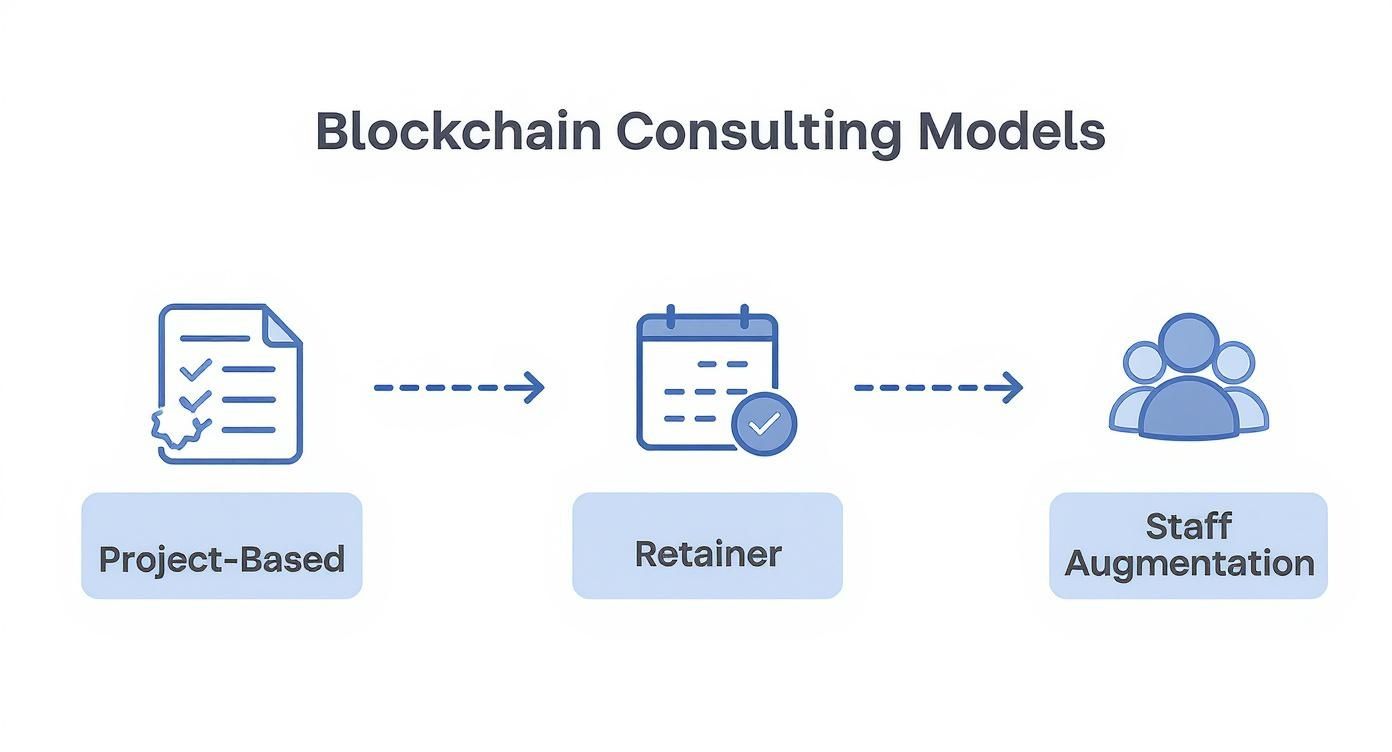
Blockchain Development Consulting: Your Path to Growth
So, you're thinking about diving into the world of blockchain, but you're not sure where to start. That's where a good consultant comes in. It's not just about hiring someone to write code; it's about bringing in an expert who can create a strategic blueprint that connects this powerful technology to your actual business goals. The aim is to ensure whatever you build is secure, can grow with you, and delivers a real return.
What Is Blockchain Development Consulting?

Think of a blockchain consultant as the master architect for your project. You wouldn't start building a skyscraper without a detailed plan from someone who deeply understands physics, materials, and regulations. In the same way, jumping into a blockchain project without an expert guide is a recipe for expensive errors and wasted potential.
Blockchain development consulting is a specialized service that closes the gap between your business vision and the often-intimidating world of decentralized tech. These experts go way beyond just programming. They offer start-to-finish strategic guidance, making sure your project is technically solid, commercially viable, and set up for success down the road.
More Than a Coder, a Strategic Partner
A consultant's most important job is to ask the hard questions before anyone starts building. They’ll dig into your current processes to find real problems that blockchain can genuinely fix, stopping you from chasing a solution for a problem you don’t have. This initial strategic work is the bedrock of any successful project.
Here’s what that process usually looks like:
- Feasibility Analysis: They first figure out if blockchain is even the right tool for the job. Sometimes, it isn't.
- Use Case Identification: Next, they pinpoint where it can make the biggest impact, like streamlining your B2B payments or locking down your supply chain.
- Technology Stack Selection: They'll recommend the best platform—whether it's Ethereum, Hyperledger, or a completely custom chain—that fits your specific needs.
- Roadmap Creation: Finally, they lay out a clear, step-by-step plan that takes you from the initial idea and prototype all the way to a full-scale launch and ongoing support.
An Exploding Demand for Expertise
This need for specialized know-how is driving huge growth in the market. The global blockchain consulting and development services market is projected to blow past $5 billion by 2025, expanding at a compound annual rate of over 25% as more and more businesses get on board. For a deeper dive into the numbers, you can check out this comprehensive report from Data Insights Market.
When you bring in a consultant, you're not just hiring a developer. You're investing in a strategic partner who can steer you through the technical minefield, head off risks, and make sure your blockchain initiative actually delivers measurable business value.
At the end of the day, this kind of partnership is what turns a complex technology project into a smart, successful business move.
Why Partnering with a Consultant Makes Sense
Jumping into blockchain without a guide is a bit like trying to navigate a maze blindfolded. You might get there eventually, but you’ll hit a lot of dead ends and waste a ton of time and money along the way. Bringing in a blockchain development consulting firm isn't just about hiring coders; it's about gaining a serious strategic advantage.
Think about it: you get immediate access to a full team of seasoned architects, developers, and strategists. The alternative is spending months trying to hire your own team, which is incredibly tough given how few true blockchain veterans are out there. This alone can shave months off your project timeline.
Gaining Strategic Clarity and Direction
The real value of a great consultant isn't just their technical skill—it's their strategic thinking. They’re there to stop you from chasing the latest blockchain hype and to make sure every dollar you spend is aimed at a real, measurable business goal. Honestly, their first job is to figure out if you even need blockchain at all.
This outside perspective is priceless. A consultant might point out that a simple centralized database would actually work better and faster for what you’re trying to do, saving you a fortune. On the flip side, they can also spot the perfect opportunity—like using a transparent ledger to slash fraud in your supply chain—that delivers a clear ROI.
A partnership with the right consultant shifts your focus from merely implementing a technology to solving a core business problem. It’s the difference between building something that works and building something that matters.
Mitigating Risks and Accelerating Development
Let's be clear: blockchain projects are complex and risky. You've got technical hurdles, security vulnerabilities, and a constantly shifting regulatory landscape to worry about. A good consulting team has been through this minefield before. They know the ins and outs of smart contract security, data privacy rules, and how to build an architecture that won't fall over when you scale.
This kind of proactive risk management is a game-changer. Consultants ensure your project is built on solid ground from day one by applying proven industry standards. A big part of their job is teaching clients about foundational principles, including essential software development best practices that are absolutely critical for building high-quality, scalable blockchain solutions.
Here’s what that expertise looks like in practice:
- Faster Problem-Solving: When you hit a technical snag—and you will—an experienced team can solve it in hours, not weeks.
- Future-Proof Architecture: They design systems that can actually grow and adapt with your business, so you aren’t stuck with an obsolete platform in two years.
- Regulatory Navigation: They help you stay on the right side of the law in a very gray area, protecting you from nasty fines and legal headaches.
At the end of the day, hiring a consultant is an investment in doing things right the first time. It ensures your blockchain project isn't just a cool experiment but a well-planned strategy that delivers real, lasting value to your business.
How to Choose the Right Consulting Firm

Picking your blockchain development consulting partner is probably the single most important decision you'll make for your entire project. The right firm is a strategic guide, a technical powerhouse, and a business accelerator wrapped into one. The wrong one? That path can lead to expensive delays, a flawed system, and a solution that never delivers on its promise.
To get this right, you have to look past the slick marketing and really dig into a firm's actual track record. Your evaluation needs to be a methodical process, focused on one thing: verifying they can deliver results that match your specific business goals.
Evaluate Proven Technical and Industry Expertise
First things first, you need to confirm their technical chops. Do they have deep, real-world experience with the specific blockchain platforms that make sense for you, whether it's Ethereum, Hyperledger Fabric, or Solana? A surface-level understanding just won't cut it. You need a team that intimately knows the quirks, strengths, and limitations of the tech they're recommending.
For a deeper dive into why this matters so much, check out our guide on understanding the differences between blockchain networks.
Just as crucial is their industry knowledge. A consultant who gets the specific regulatory hurdles and operational headaches of B2B payments will be infinitely more valuable than a team with only generic blockchain experience.
Your vetting checklist should have these non-negotiables:
- Detailed Case Studies: Don't just accept a one-pager. Ask for the full story on past projects—the problems they were hired to solve, the solutions they built, and the measurable business impact they created.
- Client References: Talk to their previous clients. Get on the phone and ask the tough questions about their communication style, how they manage projects, and if they consistently hit their deadlines.
- Technical Team Interviews: Don't let your only point of contact be a salesperson. Insist on speaking with the senior architects and lead developers who would actually be building your solution.
Comparing Large Firms Versus Boutique Agencies
The world of blockchain consulting is a mixed bag, from massive global players to small, specialized agencies. While North America currently dominates the market, Europe and Asia-Pacific are catching up fast, with giants like Accenture, IBM, and Deloitte commanding significant market share.
Choosing a partner is all about finding the right fit for your company’s culture, budget, and appetite for risk. There’s no single “best” choice, which is why a careful evaluation is so important.
The big-name firms and the smaller boutiques each bring something different to the table. Knowing these differences will help you figure out which model is the right one for you.
Comparing Blockchain Consulting Firm Types
To help you decide, here’s a quick breakdown of what you can generally expect from each type of firm.
| Factor | Large Multinational Firms (e.g., Deloitte, IBM) | Specialized Boutique Firms |
|---|---|---|
| Resources | Huge global talent pool and a wide array of service offerings. | Deep expertise in niche areas with a highly focused team. |
| Process | Well-established, often rigid methodologies and formal processes. | Agile, flexible, and can easily adapt their approach to projects. |
| Cost | Typically higher due to significant overhead and their brand reputation. | Often more competitive pricing with greater cost transparency. |
| Attention | You might be a smaller fish in a very big pond of clients. | You are more likely to get direct, senior-level attention. |
Ultimately, a large firm might offer a sense of security and a vast network, while a boutique agency can provide focused expertise and a more personal, hands-on approach. Your job is to weigh these factors against your project's specific needs and priorities.
How to Structure Your Consulting Partnership
Picking the right blockchain consulting firm is a huge step, but figuring out how you'll work with them is just as critical. This is all about setting up the relationship for success. The right engagement model makes sure everyone is on the same page about goals, budgets, and deadlines.
Think of it like this: a fixed-price contract for building a deck is perfect when you know the exact dimensions and materials. But if you're landscaping the entire backyard, you'll probably want a more flexible arrangement to adapt as the project unfolds. Each model serves a different purpose, so let's break them down.
The Project-Based Model
This is the most common and straightforward setup. You have a specific goal with clear deliverables and a firm deadline. The consulting firm gives you a fixed price to deliver exactly that. Simple as that.
- Best For: Building a proof-of-concept (PoC), running a security audit on a smart contract, or developing a minimum viable product (MVP) with a locked-in feature list.
- The Catch: There’s not much room for changes. If you suddenly realize you need a new feature halfway through, it usually means re-scoping the project and signing a new contract, which adds time and cost.
This model is your best bet when you have a crystal-clear vision of the final product.
The Retainer Model
Think of a retainer as having a blockchain expert on speed dial. You pay a set monthly fee for a certain number of hours or for access to a dedicated team of specialists. This is ideal for long-term projects or when you know the scope will probably change over time.
A retainer builds a real partnership. Your consultants get to know your business inside and out, so they can offer proactive advice and pivot with you as your needs change—all without endless contract haggles.
This model works great for a company that wants to explore several blockchain use cases over a year, needing ongoing strategic advice and development support along the way.
The Staff Augmentation Model
What if your team is solid, but you're missing one or two key skills? That’s where staff augmentation comes in. The consulting firm places their experts—like a senior smart contract developer or a blockchain architect—directly onto your team. They work under your management, just like one of your own employees.
This is the perfect way to fill critical talent gaps quickly without the long, painful process of traditional hiring. You get the exact expertise you need, for precisely how long you need it. It gives you incredible control and flexibility over your project's direction while instantly boosting your team's capabilities.
Your Blockchain Implementation Roadmap
Bringing a blockchain concept to life isn't magic; it's a process. A good consulting partner won't just start coding. They’ll walk you through a structured roadmap, turning your big idea into a real-world solution that actually works and delivers value. This step-by-step approach is what separates successful projects from expensive failures.
It all starts with a simple, honest conversation about your goals. This isn't just about tech—it’s about making absolutely sure that blockchain is the right answer to your specific problem.
Phase 1: Discovery and Strategy
This is the bedrock of the entire project. In this first phase, consultants dig in with your team to really understand what you're trying to achieve. They'll help you validate the business case, figure out who needs to be involved, and pinpoint the exact problem you're solving.
The result is a clear strategic document. Think of it as the project’s constitution, outlining the scope, technical needs, and exactly what success will look like. Skipping this step is like setting sail without a map; you'll just drift.
Phase 2: Proof of Concept and MVP Development
With a solid plan in place, it’s time to get our hands dirty—but not by building the whole thing at once. First comes the Proof-of-Concept (PoC). A PoC is a small, focused experiment built to answer one critical question: "Can this actually be done?" It’s all about testing the riskiest technical parts of your idea before you commit serious resources.

Once the PoC proves feasibility, we move on to the Minimum Viable Product (MVP). An MVP isn't a half-baked product. It’s the leanest, most essential version that can be put in the hands of real users. The goal here is to get feedback as quickly as possible and learn what people truly need, not what you think they need.
An MVP is not a scaled-down version of the final product; it is the most efficient and direct path to learning from your users. It prioritizes feedback over features, which is essential for long-term success.
Phase 3: Full-Scale Development and Optimization
Armed with a validated concept and invaluable user feedback, now it’s time for full-scale development. This is where the complete, feature-rich application gets built. It’s a phase packed with rigorous quality assurance, security audits, and performance tuning to make sure your platform is stable, secure, and ready to handle growth. For instance, your roadmap might include creative approaches, like building a Web3 app like a treasure hunt, which requires its own clear design and development pathway.
But launching the product isn't the finish line. The final piece of the puzzle is ongoing monitoring, maintenance, and improvement. Your consulting partner will help you track performance, find opportunities for enhancement, and plan future updates. This ensures your blockchain solution doesn't just launch—it evolves.
For a closer look at how this applies to the world of finance, our guide on blockchain payment solutions provides some great, practical examples.
Real-World Blockchain Success Stories

Theory and roadmaps are great, but the real measure of any technology is whether it can solve actual business problems. This is where blockchain development consulting really proves its worth—when it moves off the whiteboard and becomes a live solution that creates tangible value. The best success stories show how this strategic guidance turns messy challenges into a real competitive edge.
Let's imagine a mid-sized e-commerce company. They're constantly bogged down by the high costs and slow settlement times of cross-border B2B payments. Paying international suppliers through traditional banks takes 3-5 business days, and hefty wire fees and poor exchange rates are eating away at their profits. It's a common, and very expensive, headache.
Transforming B2B Payments
After bringing in a blockchain consulting firm, the company found a clear path forward. The consultants helped design and build a new payment system using stablecoins—digital assets pegged to a stable currency like the US Dollar.
The impact was immediate. Instead of waiting days for payments to clear, supplier invoices were settled in under a minute. Transaction costs plummeted from an average of $25 per wire transfer to just a few cents. This wasn't just about saving money; it improved cash flow and strengthened relationships with their global partners, who now get paid faster and more reliably.
This example gets to the heart of what good consulting is all about. It’s not about using blockchain for the sake of it, but about applying it surgically to fix a specific, costly business problem.
Enhancing Supply Chain Trust
Here’s another powerful example: a luxury goods retailer was fighting a losing battle against counterfeit products. Customer trust was eroding, and the brand's hard-earned reputation was on the line. A consulting team stepped in and proposed a supply chain solution built on an immutable ledger.
Now, every single product gets a unique digital identity the moment it's created. Each step of its journey—from the workshop to the warehouse to the final sale—is recorded on the blockchain. Customers can simply scan a QR code on their purchase to see its entire, verified history, proving its authenticity on the spot. This not only stamps out fraud but also builds incredible brand loyalty.
These practical applications are what's driving huge growth in the market. The crypto consulting services market was valued at USD 1.2 billion in 2024 and is expected to climb to USD 5.5 billion by 2033. That explosive growth shows just how much businesses need expert guidance in this space. You can find more insights on this trend from Verified Market Reports.
Common Questions About Blockchain Consulting
Diving into any new technology brings up a host of practical questions, and blockchain is certainly no exception. Before committing, most business leaders want to get a real feel for the nuts and bolts. Here, we'll tackle some of the most common questions we hear from clients about blockchain development consulting.
How Much Does It Actually Cost?
The first question is almost always about the budget. There’s no simple price tag, as the cost depends entirely on what you’re trying to build. A brief strategic workshop might only cost a few thousand dollars, but a full-scale implementation can easily run into six figures.
The final number really boils down to your project's complexity, the engagement model you settle on, and the size of the team needed to get the job done.
What Are the Timelines, and How Do We Measure Success?
Another big one is how long everything will take. If you’re just testing the waters, a focused Proof-of-Concept (PoC) can often be wrapped up in just 4-6 weeks. Moving on to a Minimum Viable Product (MVP), you're typically looking at a 3-6 month timeframe. For a full-blown enterprise solution with complex integrations, it's not uncommon for the project to extend beyond a year.
Measuring the Return on Investment (ROI) is just as important. Success isn't always about immediate profit; it’s about hitting specific, meaningful goals. A good consultant will help you define key performance indicators (KPIs) that truly matter to your business.
These often include things like:
- Cost Savings: Are you cutting down on transaction fees or reducing administrative overhead?
- Efficiency Gains: How much faster are your settlement times? Are workflows smoother?
- Enhanced Security: Can you point to a measurable drop in fraud incidents or data breaches?
The demand for this kind of expert guidance is exploding. In 2023, the blockchain consulting market was valued at USD 1.76 billion and is projected to soar past USD 33.52 billion by 2030. This incredible growth shows just how many businesses are realizing they need a strategic partner to navigate this space. You can discover more insights on this market growth.
Finally, for many projects, a solid grasp of how crypto payments function is a must. For a great primer on the subject, we highly recommend demystifying crypto processing in our simple guide.
Ready to transform your B2B payments or launch a seamless mass payout system? BlockBee provides the secure, non-custodial crypto payment infrastructure you need to grow. Start building with our powerful API and developer-friendly tools today at https://blockbee.io.
